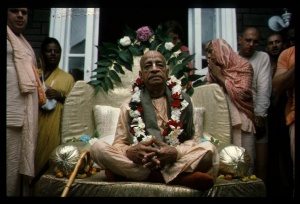CC Madhya 17.140: Difference between revisions
m (1 revision(s)) |
(Vanibot #0054 edit - transform synonyms into clickable links, which search similar occurrences) |
||
| (One intermediate revision by one other user not shown) | |||
| Line 1: | Line 1: | ||
{{ | [[Category:Sri Caitanya-caritamrta - Madhya-lila Chapter 17|C140]] | ||
<div style="float:left">'''[[Sri Caitanya-caritamrta|Śrī Caitanya-caritāmṛta]] - [[CC Madhya|Madhya-līlā]] - [[CC Madhya 17|Chapter 17: The Lord Travels to Vṛndāvana]]'''</div> | |||
<div style="float:right">[[File:Go-previous.png|link=CC Madhya 17.139|Madhya-līlā 17.139]] '''[[CC Madhya 17.139|Madhya-līlā 17.139]] - [[CC Madhya 17.141|Madhya-līlā 17.141]]''' [[File:Go-next.png|link=CC Madhya 17.141|Madhya-līlā 17.141]]</div> | |||
{{CompareVersions|CC|Madhya 17.140|CC 1975|CC 1996}} | |||
{{RandomImage}} | |||
==== TEXT 140 ==== | ==== TEXT 140 ==== | ||
<div | <div class="verse"> | ||
ātmārāmāś ca munayo | :ātmārāmāś ca munayo | ||
nirgranthā apy urukrame | :nirgranthā apy urukrame | ||
kurvanty ahaitukīṁ bhaktim | :kurvanty ahaitukīṁ bhaktim | ||
ittham-bhūta-guṇo hariḥ | :ittham-bhūta-guṇo hariḥ | ||
</div> | </div> | ||
| Line 14: | Line 18: | ||
==== SYNONYMS ==== | ==== SYNONYMS ==== | ||
<div | <div class="synonyms"> | ||
ātma- | ''[//vanipedia.org/wiki/Special:VaniSearch?s=ātma&tab=syno_o&ds=1 ātma]-[//vanipedia.org/wiki/Special:VaniSearch?s=ārāmaḥ&tab=syno_o&ds=1 ārāmaḥ]'' — persons who take pleasure in being transcendentally situated in the service of the Lord; ''[//vanipedia.org/wiki/Special:VaniSearch?s=ca&tab=syno_o&ds=1 ca]'' — also; ''[//vanipedia.org/wiki/Special:VaniSearch?s=munayaḥ&tab=syno_o&ds=1 munayaḥ]'' — great saintly persons who have completely rejected material aspirations, fruitive activities, and so forth; ''[//vanipedia.org/wiki/Special:VaniSearch?s=nirgranthāḥ&tab=syno_o&ds=1 nirgranthāḥ]'' — without interest in any material desire; ''[//vanipedia.org/wiki/Special:VaniSearch?s=api&tab=syno_o&ds=1 api]'' — certainly; ''[//vanipedia.org/wiki/Special:VaniSearch?s=urukrame&tab=syno_o&ds=1 urukrame]'' — unto the Supreme Personality of Godhead, Kṛṣṇa, whose activities are wonderful; ''[//vanipedia.org/wiki/Special:VaniSearch?s=kurvanti&tab=syno_o&ds=1 kurvanti]'' — do; ''[//vanipedia.org/wiki/Special:VaniSearch?s=ahaitukīm&tab=syno_o&ds=1 ahaitukīm]'' — causeless, or without material desires; ''[//vanipedia.org/wiki/Special:VaniSearch?s=bhaktim&tab=syno_o&ds=1 bhaktim]'' — devotional service; ''[//vanipedia.org/wiki/Special:VaniSearch?s=ittham&tab=syno_o&ds=1 ittham]-[//vanipedia.org/wiki/Special:VaniSearch?s=bhūta&tab=syno_o&ds=1 bhūta]'' — so wonderful as to attract the attention of the self-satisfied; ''[//vanipedia.org/wiki/Special:VaniSearch?s=guṇaḥ&tab=syno_o&ds=1 guṇaḥ]'' — who has transcendental qualities; ''[//vanipedia.org/wiki/Special:VaniSearch?s=hariḥ&tab=syno_o&ds=1 hariḥ]'' — the Supreme Personality of Godhead. | ||
</div> | </div> | ||
| Line 21: | Line 25: | ||
==== TRANSLATION ==== | ==== TRANSLATION ==== | ||
<div | <div class="translation"> | ||
"‘Those who are self-satisfied and unattracted by external material desires are also attracted to the loving service of Śrī Kṛṣṇa, whose qualities are transcendental and whose activities are wonderful. Hari, the Personality of Godhead, is called Kṛṣṇa because He has such transcendentally attractive features.’ | |||
</div> | </div> | ||
__NOTOC__ | |||
<div style="float:right; clear:both;">[[File:Go-previous.png|link=CC Madhya 17.139|Madhya-līlā 17.139]] '''[[CC Madhya 17.139|Madhya-līlā 17.139]] - [[CC Madhya 17.141|Madhya-līlā 17.141]]''' [[File:Go-next.png|link=CC Madhya 17.141|Madhya-līlā 17.141]]</div> | |||
__NOTOC__ | |||
__NOEDITSECTION__ | |||
Latest revision as of 22:11, 19 February 2024

A.C. Bhaktivedanta Swami Prabhupada
TEXT 140
- ātmārāmāś ca munayo
- nirgranthā apy urukrame
- kurvanty ahaitukīṁ bhaktim
- ittham-bhūta-guṇo hariḥ
SYNONYMS
ātma-ārāmaḥ — persons who take pleasure in being transcendentally situated in the service of the Lord; ca — also; munayaḥ — great saintly persons who have completely rejected material aspirations, fruitive activities, and so forth; nirgranthāḥ — without interest in any material desire; api — certainly; urukrame — unto the Supreme Personality of Godhead, Kṛṣṇa, whose activities are wonderful; kurvanti — do; ahaitukīm — causeless, or without material desires; bhaktim — devotional service; ittham-bhūta — so wonderful as to attract the attention of the self-satisfied; guṇaḥ — who has transcendental qualities; hariḥ — the Supreme Personality of Godhead.
TRANSLATION
"‘Those who are self-satisfied and unattracted by external material desires are also attracted to the loving service of Śrī Kṛṣṇa, whose qualities are transcendental and whose activities are wonderful. Hari, the Personality of Godhead, is called Kṛṣṇa because He has such transcendentally attractive features.’